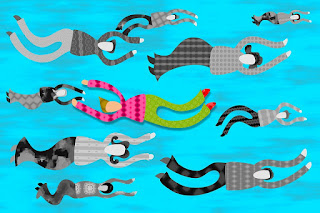Swimming against the tide
'Everyone in the small town I grew up with has children. I live in NYC now - but when ever I go back, I feel so strange. And Christmas is always difficult - I always get an air mattress in a corner while my brother and his family get the best bedroom. It sounds like I'm being petty - but I'm not upset about the sleeping arrangements.... I feel like I'm the 'odd one out' and no one knows how I fit. I don't think I want children ... I don't have a strong desire to have kids... but I think having children would mean that I felt more a part of the community and like everyone else.'
It can feel uncomfortable if you don't have children, particularly as you get older. Having children is still seen as 'the norm' and for many women, this makes the decision to have children or to not have children very challenging. As the quote from one of the women that I interviewed for my book shows, if you don't have children, you can feel sidelined. This is more acute depending on where you live. Fore instance, working with several clients in France, I'm aware that French culture is extremely family focused - more so than in the UK.
Swimming against the tide generally doesn't feel good or comfortable, particularly when we aren't sure ourselves of what we want. Even if we have a value of 'being independent' or 'doing things differently or 'being unique', it's very challenging for to do or believe something different than most of the people around us. This is called 'Groupthink' and it is a powerful psychological tool that is very hard to resist.
I work with clients to explore what their reactive pattern are under stress, pressure or conflict. When we are operating in our reactive pattern, we are mostly concerned with safety. We seek safety through approval, or control. The easiest way to get approval from our friends, family and peers is to conform to group norms.
But there is a huge cost to conforming. It takes energy to pretend to want the same thing as those around us and to suppress our own desires and needs. There can also be a sense of precariousness - and a belief that your membership as part of the group will be threatened if you don't conform. But the question is, how true is this belief? Would we really be rejected, are we really outsiders if we follow our own path? Or is this a fear that we have - in part - created?
An exercise that I think can help is to re-look at the situation with our friendship groups when we are feeling less stressed, when we are feeling calm and centered. When we can 'recover to our centre' - we can experience how much better we feel when we challenge our usual reactive pattern. When we centre we can feel more at home in ourselves, more confident, more able to move forward and make difficult choices, even is they mean that we are going to follow a different path than our peers.
So try this right now:
1. Take a breath. As you breath in, imagine the breath travelling up your body from your feet and then as you exhale, imagine the breath travelling back down you body, back down to your feet.
2. Imagine that you can expand your energy so that is becomes a bubble that surrounds you. This bubble extends about an arms length all around you. Now imagine your worries and anxious thoughts as if they were small paper balls that someone is flicking at you. As those paper balls land in your bubble, the energy holds them so that they are just pieces of information that you can assess and then let go of.
3. If you are holding any tension in your shoulders or jaw, just notice that and then allow that tension to flow out of your body.
4. Think of a quality you would like more of - it could be 'calm' or 'peace' or 'lightness' or 'ease' or any word which is a quality you think would help you at this current time. Now how the questions 'What would it be like if I had alittle bit more of my quality [insert name of quality] in my body or being right now?'
Once you have done that, look again at the situation you are in and what it would be like if you did choose not to have children; choosing a different path than many in your peer group or community. Is there anything different in how you are feeling about this choice now? Do you feel that you could make this choice and still be accepted?


Comments